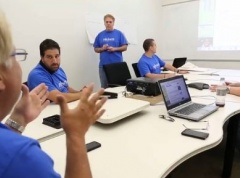 Environmental, social, and governance (ESG) programs are only as strong as the data they are built on.
Environmental, social, and governance (ESG) programs are only as strong as the data they are built on.  That’s why the most effective corporate citizenship professionals consistently gather, evaluate, and measure all available data to create initiatives that are tied to business strategy and leverage the skills and expertise of their colleagues. They set daring goals complete with milestones and targets. They are aware of all affected stakeholders and know how to reach them. They know what resources are available and which are needed for success. They continually assess, modify, and improve their efforts based on the most recent data to achieve the most business and social value possible.
That’s why the most effective corporate citizenship professionals consistently gather, evaluate, and measure all available data to create initiatives that are tied to business strategy and leverage the skills and expertise of their colleagues. They set daring goals complete with milestones and targets. They are aware of all affected stakeholders and know how to reach them. They know what resources are available and which are needed for success. They continually assess, modify, and improve their efforts based on the most recent data to achieve the most business and social value possible.
This is a hefty task, and one that is often placed on small teams, or even single individuals. Corporate citizenship professionals are asked to do a lot with a little, and that means that resourceful practitioners often look outside of their organizations to gather the information they need to create successful programs. Organizations like Nielsen, a leading global information and research company, can help ensure these programs make a lasting impact in collaboration with key nonprofits.
Nielsen uses its extensive data, measurement, and analytics capabilities to enable its clients to make the most of their initiatives, including their ESG programs, and—as part of their own corporate citizenship endeavors—extends their expertise through pro bono work with nonprofits and community groups. Through their Data for Social Good efforts—part of their global Nielsen Cares program—Nielsen associates offer organizations like the United Nations World Food Programme (WFP) the pro bono advice and support they need through skills-based volunteering to ensure that WFP’s efforts are making the most of available resources and reaching the necessary populations. Whether it’s guidance on how to update their mobile data collection or how to most effectively reach donors and key consumer groups, it’s all part of Nielsen’s commitment to “3 I’s for Uncommon Impact”—leveraging Nielsen’s insights, involvement, and investment to make an uncommon impact in its four priority cause areas of Education, Hunger & Nutrition, Technology, and Diversity & Inclusion.
“At Nielsen, we know that we are uniquely capable of helping organizations make the greatest possible impact,” said Crystal Barnes, vice president of corporate social responsibility at Nielsen. “Our associates have the skills, knowledge, and expertise to use data to affect change. It’s what we do best, and it’s part of our mission to use our data and insights to help nonprofits succeed.”
Recently, Nielsen helped WFP—the world's largest humanitarian organization fighting hunger—combat food insecurity by enabling them to better understand the needs of the populations it serves. In the past, to learn which areas lacked access to nutritious food, WFP conducted face-to-face surveys, a laborious and time-intensive process. The organization sought to take advantage of a recent surge in mobile phone use in developing areas as a means for upgrading this method, and looked to Nielsen for guidance in four key areas: data collection, methodology, analysis, and in-country expertise.
Nielsen helped WFP adapt their food security surveys so they could be conducted on the phone via interactive voice response and text message. They also worked with the organization to identify the cultural biases that informed the way questions were phrased, communications methods were selected, and data was analyzed. This assistance not only made it possible for WFP to reach a greater number of people more quickly, it also enabled the organization to collect field data in areas stricken by crisis—such as the recent Ebola outbreak.
Aiding WFP in their data collection is just one way that Nielsen’s Data for Social Good has delivered ESG value. Nielsen works with Feeding America, the nation’s leading domestic hunger-relief organization, each year for the ground-breaking Map the Meal Gap study. Nielsen provides Feeding America with food pricing data to help illuminate the cost of addressing hunger in every county in the United States.
A team of Nielsen skills-based volunteers has also supported the Minnesota-based nonprofit The Food Group by segmenting their donor database to help the organization prioritize their outreach efforts and encourage increased donations.
“Continuously looking for new and innovative ways to use data for social good isn’t just important for nonprofits and for our communities, it’s good for Nielsen,” said Barnes. “Our associates get to apply their talents to help make the world a better place in a way that only they can. They get to be part of change—change that will last because it’s been achieved thoughtfully and strategically, and because it’s been built on data.”
To learn more about how you can help your company use data to better your corporate citizenship efforts, consider joining the Center for one of our Evaluation and Measurement courses.
Subscribe to the Boston College Center for Corporate Citizenship's Blog
Get the latest business perspectives on corporate citizenship straight to your inbox.